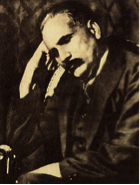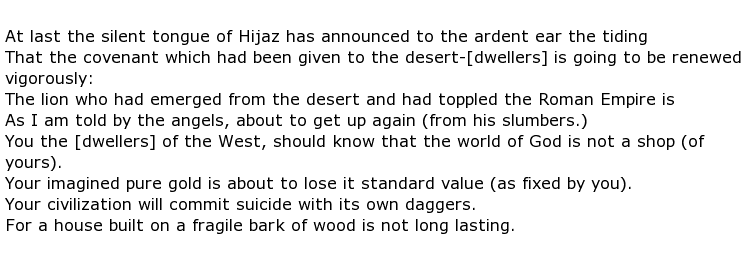 Sir Muhammad Iqbal, also known as Allama Iqbal, was a Pakistani poet and philosopher. This multi-talented man also trained at Lincoln’s Inn, London as a barrister and was much respected in academic circles. Named by the Pakistan government as a “national poet” he is widely acknowledged as being one of the driving forces behind the “Pakistan Movement”. Many literary critics and media outlooks called him the “Poet of the East”.
Sir Muhammad Iqbal, also known as Allama Iqbal, was a Pakistani poet and philosopher. This multi-talented man also trained at Lincoln’s Inn, London as a barrister and was much respected in academic circles. Named by the Pakistan government as a “national poet” he is widely acknowledged as being one of the driving forces behind the “Pakistan Movement”. Many literary critics and media outlooks called him the “Poet of the East”.
He was born on the 9th November 1877 in Sialkot which was, at the time, part of the Punjab Province of British-ruled India, but now lies within the borders of Pakistan. His family were descended from the Kashmiri Pandit Brahmin line, and Iqbal grew up in fairly humble surroundings. He loved both of his parents and, when his mother died in 1914 he wrote a short elegy in her honour, which is reproduced here:

Iqbal was well-educated with his early learning efforts centred on the Qur’an and the Arabic language. He eventually gained a Bachelors’ degree in philosophy and followed this up with an MA from the Government College in Lahore. He never really stopped learning though, and spent much of his life as a prominent poet and great Muslim philosophical thinker. His poetry has been much admired across the whole Indian sub-continent as well as by scholars much further afield.
A first collection of poetry, written in Persian, was published in 1915 with the title Asrar-e-Khudi, the English translation being Secrets of the Self. He produced many more in the Persian language as well as some in Urdu, such as Bang-e-Dara (The Call of the Marching Bell), and Zarb-i-Kalim. Iqbal also wrote and lectured in English, and he studied philosophy and the law in England. He received a knighthood in 1922 from King George V, and, as Sir Muhammed Iqbal, he agitated vigorously as part of the London branch of the All-India Muslim League on behalf of the idea of the creation of a Muslim state in Northwest India. History shows that his efforts were, eventually, rewarded with the breakaway state of Pakistan being created.
It was while living and studying philosophy in the German cities of Munich and Heidelberg that he first started to write in Persian, and this would stay with him for the rest of his life. It is said that he found writing in this language an easy way to express his true and deep thoughts. He was an intensely religious man and was passionate about both the history and the future ramifications for the Islamic faith. It was his great wish that there should never be division amongst Muslim cultures, either politically or philosophically, and his dream was the creation of a global Muslim community.
He saw mystical experiences in much of his everyday life and wrote down these visions. Here is an example, originally written in London as an Urdu ghazal:

Iqbal’s writings were so influential during the early part of the 20th century that they were translated into a good number of European languages, with English translations usually the responsibility of R A Nicholson and A J Arberry. His body of work was substantial and it is estimated that he produced at least 12,000 verses of poetry, with well over half of these being in Persian.
His final years were beset with health problems, which probably started with a trip to Spain and Afghanistan in 1933. He had a serious throat illness, and he had to give up practicing law the following year. It seems that he never fully recovered and was often ill during his final months.
Sir Muhammed Iqbal died on the 21st April 1938 at the age of 60.

